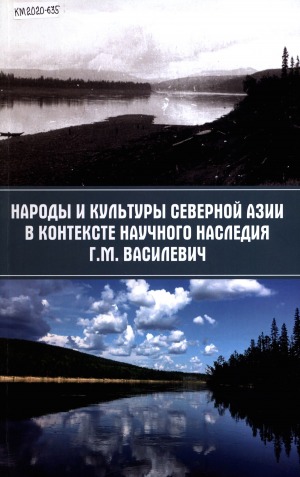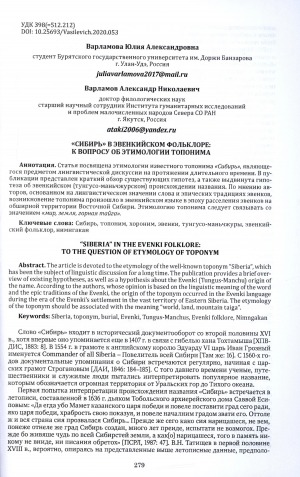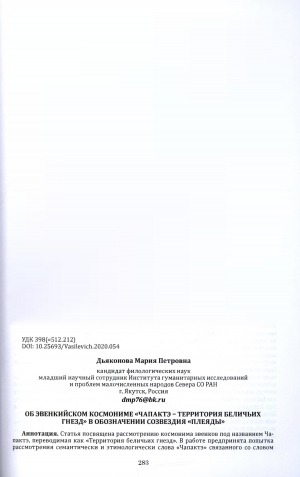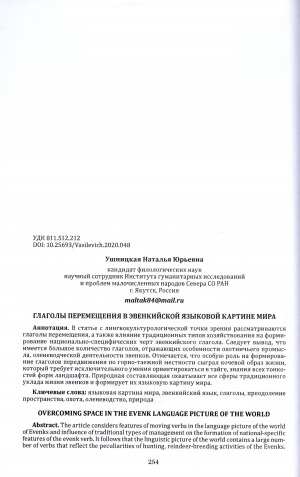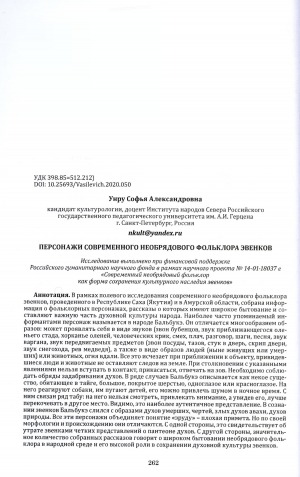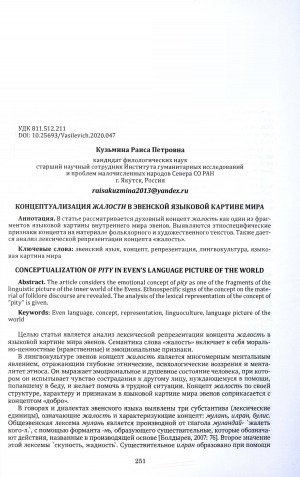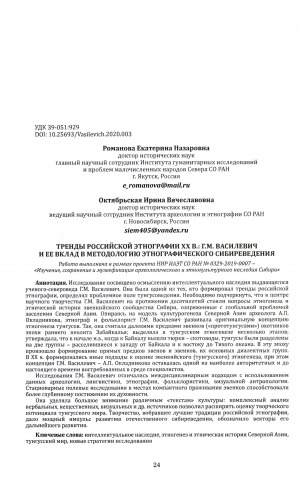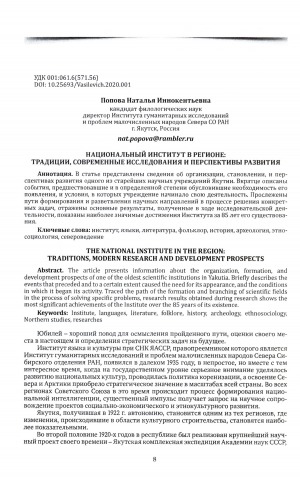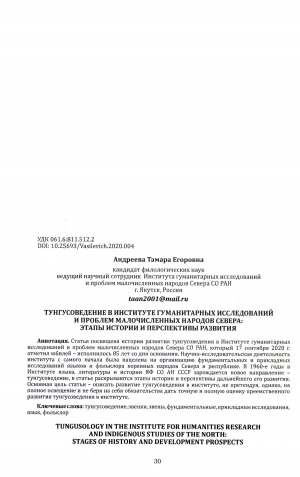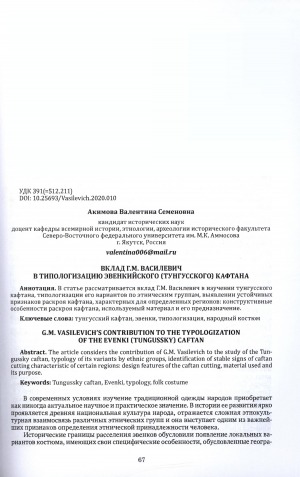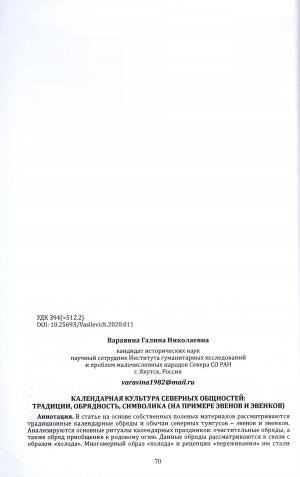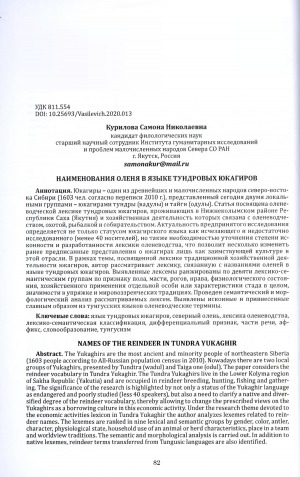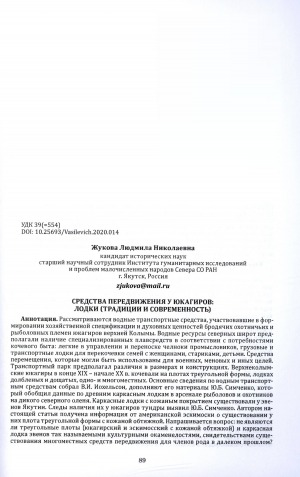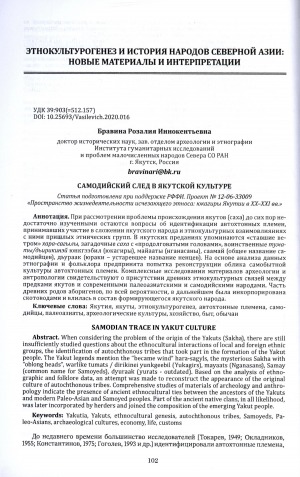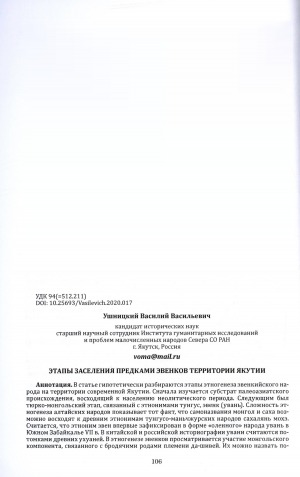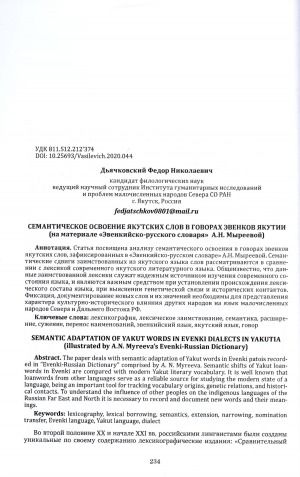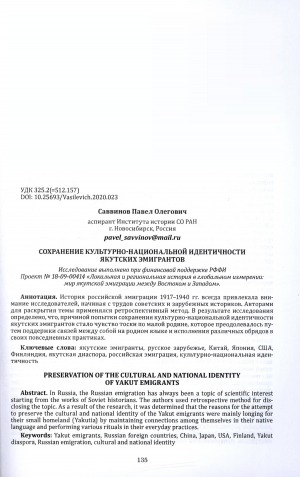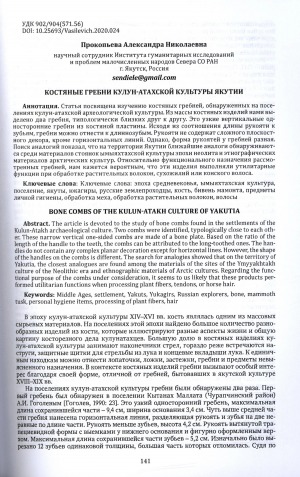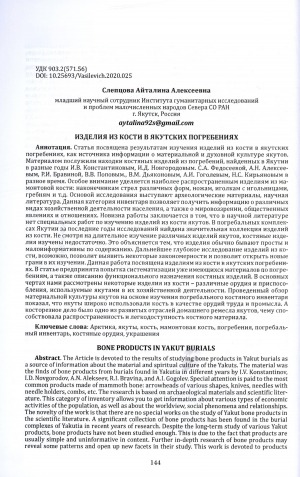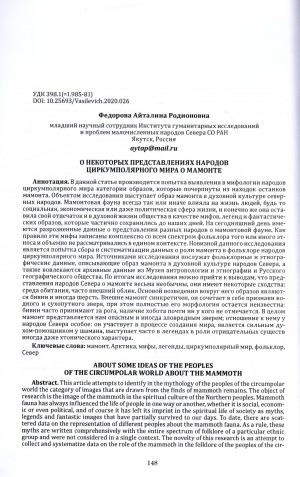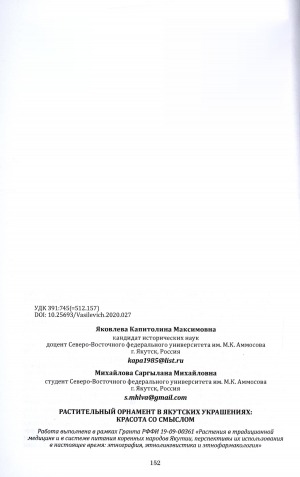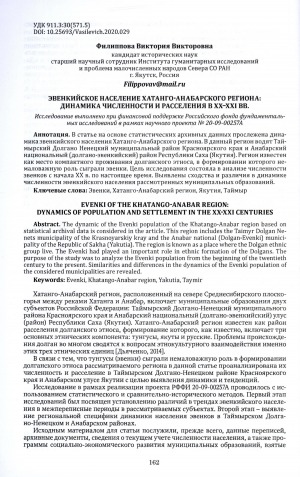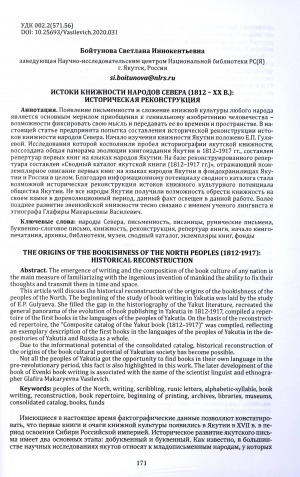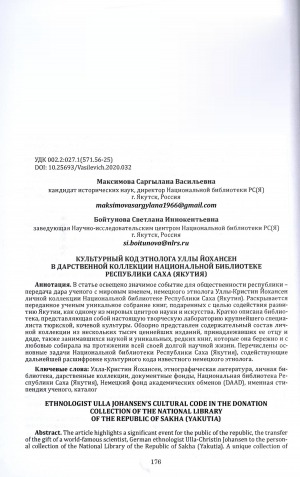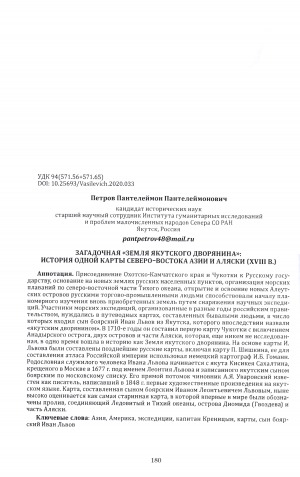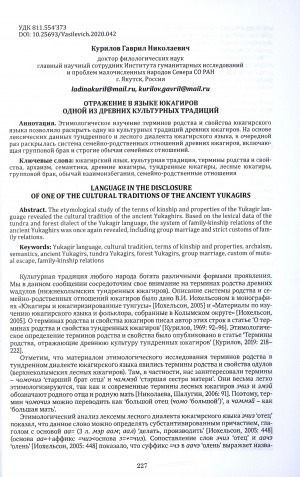
О тунгусо-маньчжурских заимствованиях в лексико-тематической группе "Пища" в якутском языке (по лексикографическим материалам) = On the tungus-manchu borrowings of the lexical-thematic group "Food" in the yakut language (based on lexicographic materials)
Статья в сборнике или глава книги
Food vocabulary is an integral part of the linguistic picture of the world. This layer of vocabulary depends on the socio-cultural changes in the life of the people. Usually, the classification of food names is typical for all languages - meat, dairy, fish, vegetable, flour, drinks, etc. Quantitative ratios depend on traditional occupations, which in one way or another prevail or play an insignificant role in the life of the people. The study of food vocabulary in the Yakut language is a synthesis of the analysis of ethnographic and linguistic sources. The Yakut cuisine was formed on the primordial Turkic layer with borrowed inclusions. Of these, the Tungus-Manchu borrowings are one of the main ones, which played a significant role in the formation of not only gastronomic culture, but also the Yakut language in its modern form. The borrowed names of food (dishes) from the Evenk, Even languages in the Yakut language are considered on the basis oflexicographic sources. As a result of a continuous sampling method, dialect words were found, which are words related to lexical borrowings. The names of the food show that mainly meat and fish dishes and their methods of preparation were borrowed. The absence of names for dairy dishes appealsto the occupation of the Evenks and Evens. The semantics of the analyzed lexemes have insignificant differences associated with the type or variety of fish (lake, river), meat (elk, bear, deer), with cooking methods that have remained largely unchanged. Derivative affixes, the phonetic appearance of dialect words are also perceived almost unchanged. The fact of such preservation indicates that the cultural development of the northern landscape took place for a long time. The lexemes considered are evidence of the cultural experience transfer, a consequence of the mutual influence of the Yakut and Tungus-Manchu languages in the vast territory of modern Yakutia. In the future, the study of the lexico-thematic group "Food” in the mainstream of language and culture can fill the linguistic picture of the world of the indigenous peoples of Yakutia
Николаев, Е. Р. О тунгусо-маньчжурских заимствованиях в лексико-тематической группе "Пища" в якутском языке (по лексикографическим материалам) / Николаев Е. В. ; Институт гуманитарных исследований и проблем малочисленных народов Севера СО РАН // Народы и культуры Северной Азии в контексте научного наследия Г. М. Василевич : сборник научных статей / ответственный редактор Л. И. Миссонова ; редакционная коллегия: А. Н. Варламов, Н. И. Данилова, Е. Г. Маклашова [и др.] ; рецензенты: Т. В. Аргунова, Т. Г. Басангова, В. Н. Давыдов ; ответственный за выпуск М. П. Дьяконова. - Якутск : ИГИиПМНС СО РАН, 2020. - С. 240-245. - DOI: 10.25693/Vasilevich.2020.045
- 1. Народы и культуры Северной Азии в контексте научного наследия Г. М. Василевич: сборник научных статей, 2020
- 2. Покатилова Надежда Володаровна. Об одной линии преемственности в становлении поэтики: А. Е. Кулаковский и Г. В. Баишев - Алтай Сарын = On continuity in the formation of poetics: A. E. Kulakovsky and G. V. Baishev - Altan Saryn
- 3. Варламов Александр Николаевич. Образ лося в мировоззрении и фольклоре тунгусо-маньчжурских народов: к вопросу о ранней истории тунгусов = The image of a moose in the worldview and folklore of tungusmanchu peoples: on the question of earlier history of tungus
- 4. Варламова Юлия Александровна, Варламов Александр Николаевич. Сибирь" в эвенкийском фольклоре: к вопросу об этимологии топонима = "Siberia" in the evenki folklore: to the question of etymology of toponym
- 5. Варламова Юлия Александровна, Дьяконова Мария Петровна. Об эвенкийском космониме "Чапактэ - территория беличьих гнезд" в обозначении созвездия "Плеяды" = About the evenki cosmonym "Chapakte - territory of squirrel nests" in the designation of the constellation "Pleiades"
- 6. Орлов Владимир Афанасьевич. Установка для измерения зенитно-азимутальных координат осей широких атмосферных ливней космических лучей: диссертация на соискание ученой степени кандидата технических наук, 1973
- 7. Яковлева Маргарита Прокопьевна. Классификация мифологических персонажей в эвенкийских героических сказаниях Н. Г. Трофимова = Classification of mythological characters in the evenk heroic tales by N.G. Trofimov
- 8. Петрова Валентина Алексеевна. Аудитория и ее влияние на творческое мастерство исполнителя эвенского эпоса = The audience and its influence on the creative skill of the performer of the even epic
- 9. Кузьмина Айталина Ахметовна. Из истории исследований мифологических основ якутского героического эпоса олонхо = From the history of research on the mythological foundations of the yakut heroic epos olonkho
- 10. Данилова Анна Николаевна. И. И. Иванов как собиратель фольклора Сунтарского улуса = I. I. Ivanov as a collector of folklore of the Suntar ulus
- 11. Ларионова Анна Семеновна. Вилюйская экспедиция М. Н. Жиркова 1943 г.: особенности работы с исполнителями = M. N. Zhirkov’s Vilyuysk expedition of 1943: features of work with performers
- 12. Чарина Ольга Иосифовна. Записи фольклора 1946 г. в Русском Устье: заимствованные сказки = Folklore records of 1946 in Russkoe Ustye: the borrowers fairy tales
- 13. Мыреева Анастасия Никитична. Судьба северного народа в историко-биографических романах А. В. Кривошапкина = The fate of the northern people in the historical and biographical novels OF A.V. Krivoshapkin
- 14. Ушницкая Наталья Юрьевна. Глаголы перемещения в эвенкийской языковой картине мира = Overcoming space in the evenk language picture of the world
- 15. Кириллина Мария Афанасьевна. Драма поэта как жанровое образование (на материале стихотворных драм И.М. Гоголева) = Poet’s drama as a genre formation (on the example of poetry dramas by I. M. Gogolev)
- 16. Охлопкова Жанна Валерьевна. Сюжетообразующий "Миф о северных кочевниках" в северном тексте литературы Якутии = The plot-forming "Myth of the northern nomads" in the northern text of the literature of Yakutia
- 17. Ефремова Екатерина Михайловна. Монтажные лирические формы в поэзии И. М. Гоголева: поэтика и архитектоника = Installation lyrical forms in the poetry of I. M. Gogolev: poetics and architectonics
- 18. Абрамова Мария Алексеевна, Гончарова Галина Савитовна, Костюк Всеволод Григорьевич. Влияние выбора родного языка на аккультурационные стратегии индивида (на примере РС(Я)) = The influence of native language on acculturation strategies of the individual (for example, RS(YA))
- 19. Васильева Ольга Валерьевна. Коренные народы Севера: проблемы развития в рамках периферийного капитализма = Indigenous peoples of the north: problems of development in the conditions of peripheral capitalism
- 20. Санникова Яна Михайловна. Традиционное хозяйство коренных народов Арктики накануне и в период постсоветских трансформаций в Якутии = Traditional economy of indigenous peoples of the Arctic on the eve and during the post-soviet transformations in Yakutia
- 21. Гончаров Николай Сергеевич. Факторы нестабильности пищевой безопасности в Аллаиховском улусе Республики Саха (Якутия) = Arctic "Laboratory" of food resources in Allaikhovskii district of the Republic of Sakha (Yakutia)
- 22. Маклашова Елена Гавриловна. Полиэтничность и поликультурность якутской Арктики: к некоторым особенностям функционирования = Polyethnicity and multiculturalism of the yakut Arctic: to some features of functioning
- 23. Астахова Ирина Сергеевна. "Настоящие" юкагиры: взгляд сквозь призму социологического исследования = "Real" yukagirs: a look through the prism of sociological research
- 24. Томаска Алена Георгиевна. Особенности миграционных процессов Арктической зоны Якутии = Features of migration processes in the arctic regions of Yakutia
- 25. Васильева Римма Иннокентьевна. Этнические группы якутов в условиях инокультурного окружения (по материалам полевых исследований) = Ethnic groups of yakuts in a foreign cultural environment (based on materials field research)
- 26. Унру Софья Александровна. Персонажи современного необрядового фольклора эвенков = Characters of modern non-ritual folklore of the evenks
- 27. Кузьмина Раиса Петровна. Концептуализация жалости в эвенской языковой картине мира = Conceptualization of pity in even’s language picture of the world
- 28. Романова Екатерина Назаровна, Октябрьская Ирина Вячеславовна. Тренды российской этнографии XX в.: Г. М. Василевич и ее вклад в методологию этнографического сибиреведения = Trends in russian ethnography of the XXth century: G. M. Vasilevich and her contribution to the methodology of ethnographic studies of Siberia
- 29. Петров Пантелеймон Пантелеймонович. Один пример арендных отношений между тунгусским родом и золотопромышленниками (вторая половина XIX в.) = One example of the rental relationship between the tunguska clan and gold miners (the second half of the XIX century)
- 30. Попова Наталья Иннокентьевна. Национальный институт в регионе: традиции, современные исследования и перспективы развития = The national institute in the region: traditions, modern research and development prospects
- 31. Андреева Тамара Егоровна. Тунгусоведение в институте гуманитарных исследований и проблем малочисленных народов Севера: этапы истории и перспективы развития = Tungusology in the institute for humanities research and indigenous studies of the North: stages of history and development prospects
- 32. Акимова Валентина Семеновна. Вклад Г. М. Василевич в типологизацию эвенкийского (тунгусского) кафтана = G. M. Vasilevich’s contribution то the typologization of the evenki (tungussky) caftan
- 33. Варавина Галина Николаевна. Календарная культура северных общностей: традиции, обрядность, символика (на примере эвенов и эвенков) = Calendar culture of northern communities: traditions, rituals, symbols (using the example of evens and evenks)
- 34. Курилова Самона Николаевна. Наименования оленя в языке тундровых юкагиров = Names of the reindeer in tundra yukaghir
- 35. Жукова Людмила Николаевна. Средства передвижения у юкагиров: лодки (традиции и современность) = Yukagir boats: traditions and modernity
- 36. Баишева Саргылана Макаровна. Этнические особенности пространственного развития коренных малочисленных народов Севера прибрежной части якутской Арктики = Ethnic features of the spatial development of the indigenous peoples of the coastal part of the yakut Arctic
- 37. Бравина Розалия Иннокентьевна. Самодийский след в якутской культуре = Samodian trace in yakut culture
- 38. Ушницкий Василий Васильевич. Этапы заселения предками эвенков территории Якутии = The stages of settlement by the ancestors of the evenks of Yakutia
- 39. Алексеева Сардаана Анатольевна, Долгунова Карина Юрьевна. Югюлятцы Вилюйского улуса Якутии: проблемы этногенеза и этнической истории = Yugulyats of Vilyui district of Yakutia: problems of ethnogenesis and ethnic history
- 40. Сулейманов Александр Альбертович. Научное изучение юкагиров Якутии в 1980 е годы = The scientific study of the yukaghirs of Yakutia in 1980-ies xx century
- 41. Васильев Валерий Егорович. К терминам "Шаман" и "Кам" у тунгусов и тюрков: опыт лингвистических и этнографических параллелей между эвенками и саха = То the terms “Shaman" and "Kam" among tungus and turks: experience of linguistic and ethnographic parallels between evenks and sakha
- 42. Дьячковский Федор Николаевич. Семантическое освоение якутских слов в говорах эвенков Якутии (на материале "Эвенкийско-русского словаря" А. Н. Мыреевой) = Semantic adaptation of yakut words in evenki dialects in Yakutia (illustrated by A.N. Myreeva's Evenki-Russian Dictionary)
- 43. Саввинов Павел Олегович. Сохранение культурно-национальной идентичности якутских эмигрантов = Preservation of the cultural and national identity of yakut emigrants
- 44. Прокопьева Александра Николаевна. Костяные гребни кулун-атахской культуры Якутии = Bone combs of the kulun atakh culture of Yakutia
- 45. Слепцова Айталина Алексеевна. Изделия из кости в якутских погребениях = Bone products in yakut burials
- 46. Федорова Айталина Родионовна. О некоторых представлениях народов циркумполярного мира о мамонте = About some ideas of the peoples of the circumpolar world about the mammoth
- 47. Яковлева Капитолина Максимовна, Михайлова Саргылана Михайловна. Растительный орнамент в якутских украшениях: красота со смыслом = Floral ornament in yakut jewelry: beauty with meaning
- 48. Филиппова Виктория Викторовна. Эвенкийское население Хатанго-Анабарского региона: динамика численности и расселения в XX-XXI вв. = Evenki of the Khatango-Anabar region: dynamics of population and settlement in the XX-XXI centuries
- 49. Санникова Яна Михайловна. Традиционные хозяйственные занятия коренного населения Анабарского региона Якутии на рубеже XX - XXI вв. в контексте исследования культурного ландшафта = Traditional economic activity of the indigenous population of the Anabar region of Yakutia at the turn of the XX-XXI centuries in the context of cultural and landscape research
- 50. Бойтунова Светлана Иннокентьевна. Истоки книжности народов Севера (1812 - XX в.): историческая реконструкция = The origins of the bookishness of the North peoples (1812-1917): historical reconstruction
- 51. Максимова Саргылана Васильевна, Бойтунова Светлана Иннокентьевна. Культурный код этнолога Уллы Йохансен в дарственной коллекции Национальной библиотеке Республики Саха (Якутия) = Ethnologist Ulla Johansen's cultural code in the donation collection of the National library of the Republic of Sakha (Yakutia)
- 52. Петров Пантелеймон Пантелеймонович. Загадочная "Земля якутского дворянина": история одной карты Северо-Востока Азии и Аляски (XVIII в.) = Mysterious “Land of the yakut nobleman": the history of a map of Northeast Asia and Alaska (XVIII centure)
- 53. Курилов Гаврил Николаевич. Отражение в языке юкагиров одной из древних культурных традиций = Language in the disclosure of one of the cultural traditions of the ancient yukagirs
- 54. Яковлев Айтал Игоревич, Новгородов Айсен Станиславович. Культурная память в повседневной жизни современных якутов (к постановке проблемы) = Cultural memory in the everyday life of modern yakuts (to the statement of the problem)
Войдите в систему, чтобы открыть документ
